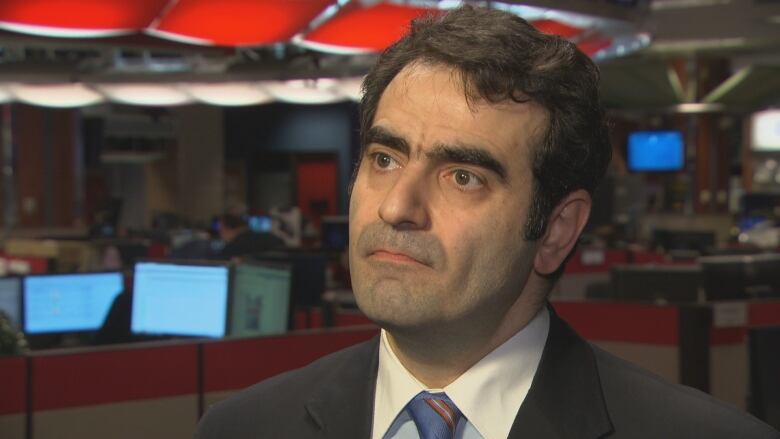Foreigners who sign up to fight ISIS now face wrath of Turkish army
Turkish ambassador to Canada says government should stop Canadians from joining Kurdish groups

The death of Edmonton's Nazzareno Tassone in a Syrian skirmish is another reminder — if one was needed — of the dangers of civilians joining the fight against ISIS.
Tassone, who was killed in December but whose family only learned of his death this week, is the second Canadian to die after joining the ranks of the Kurdish YPG, or People's Protection Units. Several veterans of the Canadian Forces have fought alongside the group.
Canadians who have fought with the Kurdish YPG in Syria have already accepted the dangers inherent in battling a group like ISIS. But now they also risk finding themselves embroiled in a conflict with the region's most powerful military: Canada's NATO ally Turkey.
Turkey views the YPG as a mere "franchise" of the Kurdistan Workers Party, or PKK, banned as a terrorist organization in both Turkey and Canada. The PKK is a secular, socialist group fighting for an independent Kurdish homeland in eastern Turkey.
But Canada has not listed the YPG as a terror group, and the U.S. has actively supplied it with arms and sent American soldiers to fight alongside it, infuriating the Turks.

"Global Affairs Canada has long advised against all travel to Syria and Iraq for any reason," said Jean-Philippe Levert of Public Safety Canada.
"The Kurdistan Workers Party (PKK) is currently a listed entity. The YPG is not currently a listed terrorist entity. However, Canadians fighting with or participating in the activities of an entity that has carried out terrorist activities or who individually facilitates such activities may be guilty of an offence under the Criminal Code."
So far, while some Canadians have been questioned about their time with the YPG, none has faced any charges or been accused of participating in actions against Turkish targets or interests.
YPG itself, though, has done little to conceal its PKK connections. Last spring, it renamed a Syrian airbase it captured after the PKK's imprisoned leader, Abdullah Ocalan.
Ocalan's face features prominently on posters at YPG camps and glares from banners at the swearing-in ceremonies of new YPG recruits.
The YPG's ties to Ocalan go back to the 1990s, when he was a guest of the Assad regime. In 1998, Syria reached a secret deal with Turkey, and Ocalan lost his safe haven, only to be captured a few months later. But his followers remained active in Syria's Kurdish community and in 2003 founded the PYD, or Democratic Union Party. YPG is the party's armed wing.
Kurds seen as the good guys
It's not clear how much of that history is known among the idealistic young Westerners who have flocked to join the YPG. They are drawn by the YPG's fierce struggle against ISIS, its undeniable egalitarianism (reflected in the fearless female fighters among its ranks), as well as its tradition of protecting non-Kurdish and non-Muslim minorities.
Indeed, since the days of Saddam Hussein's pogroms against them, the Kurds have come to be seen by many Westerners as the region's only real "good guys."
But to Turkey's Islamist president, Recep Erdogan, the YPG is merely the most successful branch of the government's deadly enemy, the PKK.

Kurdish militants have staged a number of attacks in Turkey this year, and Turkish officials are also pinning Thursday's attack in Izmir on them. Unlike ISIS, which aims for soft targets, Turkish civilians and foreigners, the PKK has targeted Turkey's security forces.
Turkey's ambassador to Canada, Selcuk Unal, says his country has traced two major 2016 bombings targeting soldiers and police back to YPG camps in northern Syria. Unal says Turkey wants Canada to do more to stop Canadians from joining the group.
"In order to fight a terror organization, you don't need to be allied to another terror organization," says Unal. "This is something we have been asking of our NATO allies, including Canada, for a long time."
There have already been many clashes between Turkish forces and the YPG, beginning with firing across the Turkish border. One of the best-known foreign YPG volunteers, American army vet Jordan Matson, says Turkish tanks within Turkey fired on his position while he was fighting ISIS forces in Kobani. (Other Western volunteers have also accused the Turkish government of assisting ISIS in its fight with the Kurdish militia.)
Then in late August, the Turkish army launched Operation Euphrates Shield, driving into northern Syria with the declared aim of pushing both ISIS and the YPG away from its borders. Since then, clashes between the Turks and the YPG have become more frequent.
Excluded from peace talks
The YPG's position was greatly complicated on Dec. 30 when a Syrian ceasefire brokered by Turkey and Russia came into effect. Syria-wide talks are scheduled to begin later this month in Kazakhstan. Specifically excluded from the peace process are two jihadi groups, ISIS and Al Nusra (al-Qaeda's franchise in Syria), and, at Turkey's insistence, the YPG.
The agreement between Turkey and Russia represents a tacit recognition by Turkey's leadership that its goal of deposing President Bashar al-Assad and replacing him with a Sunni Islamist government is no longer within reach. In return for Turkey dropping its support for the rebel side, Russia and Syria appear to be giving the Turks a free hand to turn its guns on the Kurdish YPG.

Erdogan has pledged that Turkey's army will force the group to withdraw to the east of the Euphrates River, giving up the territory it has won from ISIS. YPG appears unlikely to cede that territory without a fight.
Unal warns that foreigners serving in YPG's ranks will not be spared the wrath of the Turkish army.
"If we are fired at by YPG, it's only natural that we will retaliate," the ambassador said.

